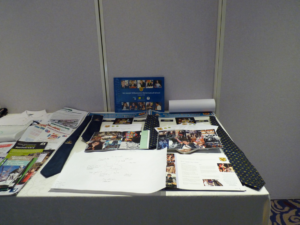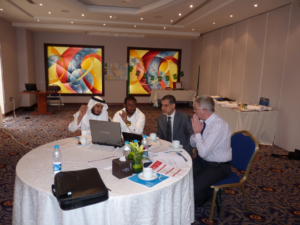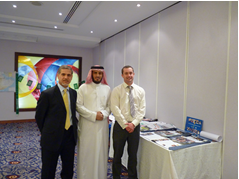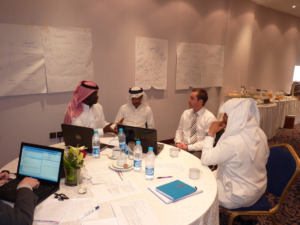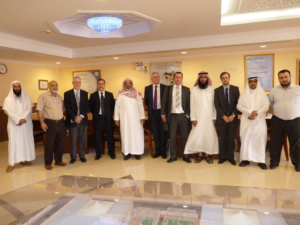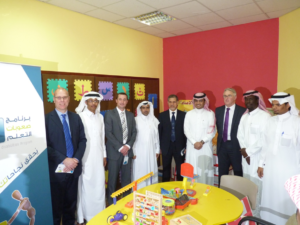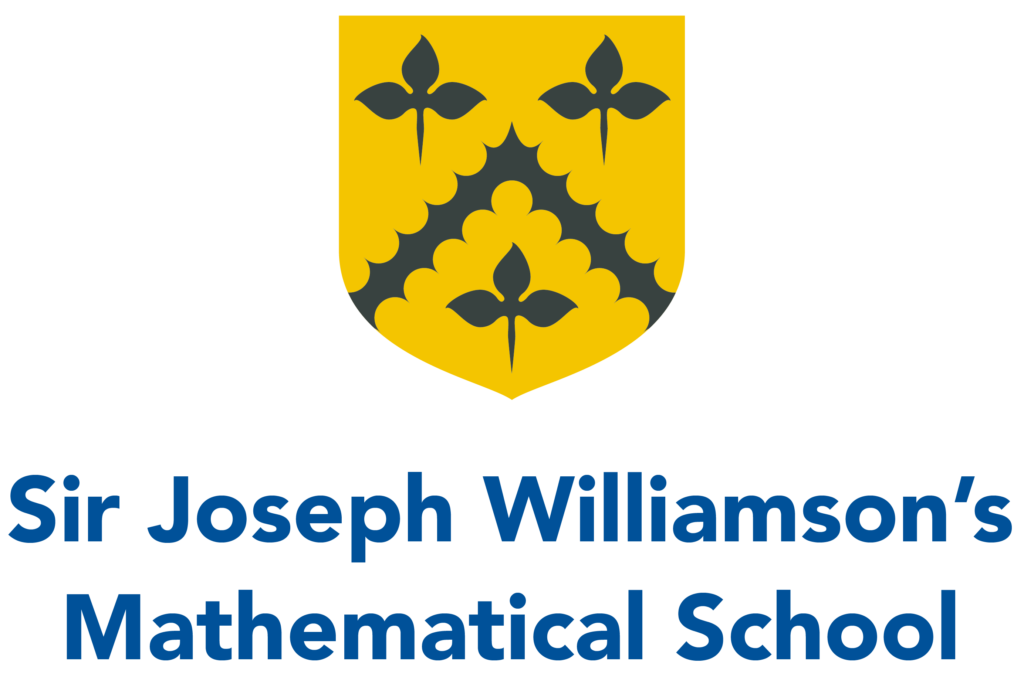1. Introduction
The International School Award rewards schools that have shown a commitment to embedding international awareness and understanding within their class or school.
The British Council encourages this by supporting schools in completing collaborative, curriculum-based work with a number of international partner schools, and involvement of the wider community.
As the International School Award journey continues, you will learn of new ways to develop and embed international education in your school.
The International School Award is available in 16 countries and is well-regarded by school inspection bodies and ministries of education globally.
There are four levels which are summarised below.
-
- Foundation Level – This is for schools that are beginning their international education journey.
- Intermediate Level – This is for schools that have partnered with schools and have begun working with them collaboratively.
- Accreditation Level – This is for schools that have established a programme of activities around international education and embedded learning across the school.
- Reaccreditation Level – This is for schools that have successfully completed the Accreditation level and want to confirm their school’s commitment to international education.
At Sir Joseph Williamson’s Mathematical School we have gone through all the stages above and we are in the process of applying for our second reaccreditation.
2. Our Journey for International Education and International School Award
Our school’s journey for international work started in 2012 through the British Council’s Connecting Classrooms programme by linking with schools in the Middle East to start with. As part of the programme we formed a cluster which is called the Medway cluster consisting of our school, Greenacre Academy and Bradfields Academy. The Medway cluster linked with another cluster which is called the Riyadh cluster in Saudi Arabia. The Riyadh cluster consisted of 5 schools. In our first visit to Riyadh in Saudi Arabia we worked with teachers and education leaders to create a number of joint projects.
As a result of our first visit to our partner schools in Riyadh we created 4 projects which are:
-
- Cultural Exchange. The aim of this project was to know what a school day and weekend in the life of a Saudi or a United Kingdom student would be like. This project made our students aware of the differences in the two cultures and also reminded them of some of the core British Values. This involved Year 8 students as part of the tutorial programme in the academic year 2012 / 2013.
- Healthy living. The aim of this project was to develop an understanding of how to live in a healthy manner and to develop knowledge and understanding of cultural differences in relation to health such as food, exercise, smoking, alcohol, etc.
- Renewable Energy Sources. The focus was on comparative renewable energy sources and their efficiency. The main aim was to make the students aware of the various renewable energy sources in various parts of the world, with the focus on the United Kingdom and Saudi Arabia, based on their local climate, for example, wind farms, tide generators, solar energy, etc. This was done by Year 9 students during science lessons.
- Special Educational Needs teaching and provision development. The aim was to share good practices in order to develop SEN Provision in both countries.
International Policy – Sir Joseph Williamson’s Mathematical School
Through the inclusion of an international focus in Sir Joseph Williamson’s Mathematical School, we are able to offer to our students a range of experiences that will enhance their learning and raise awareness of their national and international identity.
The governors and staff recognise that:
- Global issues are an important part of the lives of our students living in a world where economies are increasingly interdependent and global communication is a daily reality. Our students have access to the internet and increased opportunity to travel, watch news stories from around the world, as they develop and follow for example, international sporting events as they happen.
- The global dimension should be reflected in the attitudes and values of our students, the ethos of the school, the Programmes of Study and Key Skills.
- As a school we have a commitment to both gender and racial equality.
Aims
To enable our students to know more about global issues and to:
- Celebrate the rich and diverse heritage represented in our school, and local and national communities.
- Understand the complex international interdependencies in the global economy.
- Respect and value different cultures and beliefs.
- Enjoy regular contact with students and adults living in different countries.
- Encourage greater involvement in environmental issues.
- Develop curiosity about other cultures.
- Enable pupils, staff and governors to experience daily life in other countries
- Provide an added opportunity for the promotion of equal opportunities, racial equality and Citizenship.
- Encourage pupils to consider themselves Global Citizens.
Objectives
- To work towards maintaining the International School Award.
- To conduct annual audits of both our formal and informal curriculum which, in turn inform action plans to develop each of the eight Key Concepts of the global dimension through all appropriate areas of the curriculum such that there is a clearly mapped global dimension in the learning experiences for all our students. These eight key concepts we recognise as:
- – Diversity.
- – Conflict resolution.
- – Global citizenship.
- – Human rights.
- – Interdependence.
- – Social justice.
- – Sustainable development.
- – Values and perceptions.
- To develop and fully exploit a variety of global learning partnerships. This will include activities such as:
- – Email and internet projects including video conferencing.
- – Interacting with visitors from other countries, students and adults.
- – Student / staff visits to places of cultural interest in the UK and abroad.
- – Student exchanges and foreign work experience placements.
- To actively encourage the study of foreign languages for all our students by offering a range of appropriate language options.
- To provide staff with opportunities to compare different teaching and learning styles.
- To increase the awareness of the global dimension to staff, students and the wider community across the whole school.
- To identify and embed the global dimension in new areas of the curriculum.
- To investigate the wider community impact.
- To conduct an audit of global dimension across the whole school with a focus on embedding activities with international dimension in all subjects.
- To highlight the areas with international dimension within the tutorial programme at all key stages.
- To organise regular celebrations of our rich and diverse heritage.
Our international work with partner overseas schools and the international dimension to our curriculum was recognised by the British Council and as a result the school has earned two International School Awards at Foundation and Intermediate levels in 2013.
3. Full International School Award (2014 – 2017)
We extended our international work and involved more students from all age groups. We also extended our links with more partner schools in Europe and the Far East in addition to our links with the schools in the Middle East. We decided to apply for the full International School Award by submitting an action plan for our international work during the 2013 – 2014 academic year. The action plan involved the following activities:
-
- Cultural Exchange. The aim of this project was to know what a school day and weekend in the life of a Saudi or a United Kingdom student would be like. This project made our students aware of the differences in the two cultures and also reminded them of some of the core British Values. This involved Year 8 students as part of the tutorial programme in the academic year 2013 / 2014.
- Healthy living. The aim of this project was to develop an understanding of how to live in a healthy manner and to develop knowledge and understanding of cultural differences in relation to health such as food, exercise, smoking, alcohol, etc.
- Comparative renewable energy sources and their efficiency. The main aim of this activity is to be aware of the various renewable energy sources in various parts of the world based on their local climate, e.g. wind farms, tide generators, solar etc… For this project the students have done research about the various types of renewable energy sources and their efficiencies. They have been producing some posters about the various types of renewable energy sources depending on climate. For example, students explored Solar Energy sources in Saudi Arabia and Wind and Tidal Wave energies in the UK. The project enriched the curriculum and enhanced the students? knowledge in Science according to the Head of Science This project was mainly undertaken by Year 9 students during science lessons.
- The UN Millennium Development Goals are and how they link to development indicators. Students look at what the UN Millennium Development Goals are and how they link to development indicators, and study which parts of the world are making more or less progress towards meeting them and why. Students look at how Birth Rates, Death Rates and other development indicators (including social influences like religion and a lack of contraception) influence population structures in richer and poorer countries (e.g. the UK compared with Kenya). Students also study Plate Tectonic. They look at examples of an earthquake, Tsunami, and Volcano in different parts of the world (e.g. Mount Merapi, Java, Indonesia) and look at prediction, effects and responses.
- The history of Pi. Year 7 students carry out a study about the history of Pi and make a display. This includes studying how the ancient civilisations such as the Babylonians and the Egyptian calculated the value of Pi.
- Young People’s Place in the World. The whole of the KS3 curriculum focuses on Young People’s place in the World. Students complete a six week unit of study on Islam. As well as considering the beliefs and practices of Islam, they focus on the impact Islam has had on our World, in terms of mathematical and scientific advancement. They also consider the challenges young Muslims might face in practising their religion in a multi-faith or secular society. Studies start by focusing on Saudi Arabia, and the influence of Mecca, and spread to understand of Islam across the World on in the UK. At the end of the Year, students compare and contrast the similarities and differences found in a range of religious festivals, contrasting the beliefs and practises found in these across the World. Students compare the Moral codes of a range of Religions, including the practice of Christianity, Islam and Buddhism, and the impact of these beliefs on the lives of individuals. They link this with a lesson comparing forms of Government. Students research the style of Government of one country other than the UK for homework. They link this work in with bullying and discrimination. At the end of the Year students look at a variety of places of worship and discuss how these are used by different communities. Cultural awareness and diversity continues to be a significant theme. They discuss initiation in a range of cultures and situations.
- French exchange. Since 2010 we have had an exchange with students in year 9 with students in Robert Desnos School in Masny. This exchange involves termly communication and exchange of work between students. We exchange classwork which follows our scheme of work and the French students produce exemplars in French for our pupils to model and use. We request that pupils provide English exemplars of topics they are covering in France that the French students could use to improve their level of English. Any work undertaken in English to support the French students is done in their free time. In term one we exchange an introductory letter which introduces the pupil and his family. In term 2 we exchange a piece regarding what they used to be like when they were younger and which focuses on the imperfect tense. In term 3 we exchange work on an account of future projects and plans. In February the pupils from France join us in England and attend school with their exchange partner for the day. Pupils follow a condensed timetable and get a genuine experience. In May we visited the school.
- World Music project. As part of the Curriculum for KS3 pupils will music from various parts of the world.
-
-
- Year 7: They will explore African Drumming
- Year 8: They will explore Indian Music
- Year 9: They will be involved in a World Music Project
-
Students get the opportunity not just to learn the musical features of these styles but to try out some authentic instruments and experiment using the techniques. They also look at how the music is affected by its context and how the music has developed.
Partner Schools:
- Alnoman Bin Malek School
- King Abdulaziz City Intermediate School
- Attaa bin Rabah Intermediate School
- Ibn Badees Intermediate School
- College Robert Desnos School in Masny
- No. 3 High School, Foshan
This resulted in receiving the prestigious full International School Award in August 2014.
4. Reaccreditation Application for the Full International School Award (2017 – 2020)
We submitted an Action Plan for Reaccreditation in November 2016.
We plan to carry out the following projects during this academic year and beyond:
- Looking at sustainability in European cities particularly in the areas of agriculture, waste, buildings and transport. Students will look at sustainability of agriculture, waste, buildings and transport in their countries and then share this information during student mobility’s overseas.
- Science is fun! Teachers and students will look at the importance of science in the international market.
- French Languages and cultural awareness. Students compare and contrast the similarities and differences found in the languages and the cultures of the two countries.
- The history of Pi (π). The students take this opportunity to explore this new symbol for the first time with its historical relevance.
- Sustainable Development Goals (SDG) and Plate Tectonics. Students will look at what the SDG are and how they link to development indicators and look at examples of an earthquake, Tsunami, and Volcano in different parts of the world.
- Young People’s Place in the World. Students will be able to compare and contrast the similarities and differences found in a range of religious festivals, contrasting the beliefs and practices found in these across the World.
- World Music Project. Students get the opportunity to try out some authentic instruments and experiment using the techniques.
- Japanese Language and Culture Programme. During the visit to the Japanese school the students take the opportunity to learn calligraphy, origami, Japanese song and dance and more of the Japanese language.
- Studying the history of different countries. Students will, as a result, gain a greater understanding of the history of a number of countries. For the holocaust and occupation research students will research life under occupation and the effect of the war on the Jewish population.
- In addition students visited Barcelona on a full immersion language course. As part of the visit, the students reflected on the importance of Castilian, the Spanish that they are learning, and Catalan, the regional language, which are both used to teach in various subjects.
Partner Schools:
Partner School 1:
Lycee Xavier Mallet
Rue Frederic Mistral, 07400, FR
Partner School 2:
Kopernikus-Gymnasium
Kopernikusstrabe 61, 48429, DE
Partner School 3:
Busto Arsizio
Busto Arsizio, 21052, IT
Partner School 4:
Sotunginlukio School
19 01200 VANTAA, 19 01200, FI
Partner School 5:
Liceo Scientifico A. Pacinotti
via XV Giugno, via XV Giugno, IT
Partner School 6:
IES Fuente Grande
Avenida Blas Infante, Alcalá del Valle, ES
Partner School 7:
Gaujas 41
Jaunpiebalga, LV-4125, LV
Partner School 8:
College Robert Desnos
Rue Georges Janin Coste, 38140, FR
Partner School 9:
Kanto International High School
3-2-2 Honmachi, 151-0071, JP
Partner School 10:
Colegio Internacional
Calle Pelai, 9, 08001, ES
Action Plan Feedback
Below is the feedback from the independent assessor.
The fact that you are able to engage with several different partner schools to create an array of interesting international learning opportunities for your students, is commendable. You clearly state that on-going planning with partner schools is aimed at engaging students across the whole school age range. As a result of your commitment to designing an inspiring Action Plan, I am pleased to inform you that I am recommending Sir Joseph Williamson’s Mathematical School for British Council International School Award reaccreditation. As your Action Plan for reaccreditation demonstrates, it is apparent that you place a strong emphasis on delivering international education across a broad curriculum, raising students’ awareness of different cultures and social conditions through a well-planned Life Skills programme, whilst at the same time, ensuring that some activities draw global learning into STEM based projects. These are closely linked to real life situations, relevant to themes students can identify with through personal experience, or aimed at introducing them to new opportunities.
Erasmus projects linking science and economics, and working alongside European partner schools, also includes a Modern Foreign Language element, but you also demonstrate the importance of MFL through a close link with a French partner school.
Through clever planning a Maths activity is placed in a historical context, which is not only linked to modern computer studies, but relates to other cross curricular activities encompassing global learning.
You also intend to introduce New Sustainable Development Goals; you present a concise description of how students will implement this through researching development indicators under different geographical conditions in different parts of the world. Again, the way you combine several concepts is due to excellent planning. This activity deals with an important current global theme, you may want to consider expanding the part on evaluation evidence, and explain in greater detail, how data based evidence produced in the study will be represented through posters, for instance.
Through excellent preparation for visits to partner school countries, at Sir Joseph Williamson’s Mathematical School you strive to provide optimum opportunities for your students to experience international education on a practical level. To reinforce the school’s intention to move forward, you comprehensively describe the aims and expected outcomes of all activities, and your methods of gathering and evaluating evidence are systematic and very effective. Congratulations on your achievement in gaining International School reaccreditation.
This resulted in receiving the prestigious full International School Award in August 2017.
5. Reaccreditation Application for the Full International School Award (2020/2021 – 2024)
We plan to carry out a minimum of 10 curriculum-based international learning activities covering a variety of subjects and involving most of the pupils in the school from Years 7 to 13. The international activities are developed over the course of the academic year and embedded effectively into the school’s curriculum which also brings an aspect of sustainability into our international work. Three of the activities are done in partnership with partner schools in other countries; these activities are:
- Renewable energy sources. The main aim of this project is to understand what renewable energy sources are and how they can be used more widely and more efficiently.
- Promoting communication and team building. This promotes the importance of working alongside other cultures and learning to communicate in new ways, including language.
- Gender equality. With the help of this project, we want to put the debate on gender equality once more in the spotlight.
The activity which contain a foreign language element is:
- Year 7 – French Pas de Calais visit, Year 9 – French Christmas; customs and cultural awareness and Year 10 – French visit to Paris. Students learn about French customs and culture and compare them to their own. All the activities above have elements of cultural exchanges. In addition to the 4 activities mentioned above, there are 6 more activities with international learning elements, details of which are summarised in the activity section.
Activities:
- Promoting communication and team building.
- Millennium Development Goals/Sustainable Development Goals, and Plate Tectonics.
- Studying the history of different countries.
- Young People’s Place in The World.
- Year 7 – French Pas de Calais visit / virtual visit Year 9 – French Christmas; customs and cultural awareness and Year 10 – French visit / virtual visit to Paris.
- Studying International Relations.
- Cross cultural studies in psychology.
- Studying the history of Pi and i.
- Renewable Energy to Save our Planet: An Ethics for the Citizens of Tomorrow.
- Gender equality
Partner Schools:
Partner School 1:
Liceo Scientifico Statale “Antonio Pacinotti”
Via XV Giugno, 19123, IT
Our partnership with this school started more than three years ago through the British Council eTwinning System. We have been working with this school collaboratively in a variety of projects / activities. In addition, we have linked with this school via Skype in a number of seminars about sustainability and renewable energy sources. The most recent seminar took place on Wednesday 4th December 2019. About 50 students from our Years 12 and 13 participated in this seminar. This was an excellent opportunity for them asking the professor from Genoa university a number of questions related to renewable energy sources. This generated a valuable discussion, which benefited students and teachers involved. We stay in contact with the school by emails, phone calls and visits.
Partner School 2:
International School of Latvia
Meistaru iela 2, LV-2107, LV
Our partnership with this school started more than three years ago through the British Council eTwinning System. We stay in contact with the school by emails, phone calls and visits.
Partner School 3:
Denmark International School
Levantkaj 4-14, 2150, DK
Our partnership with this school started through the British Council eTwinning System. We stay in contact with the school by emails, phone calls and visits.
Partner School 4:
Portuguese International School
Agrupamento de Escolas de Fornos de Algodres, Agrupamento de Escolas de Fornos de Algodres, PT
Our partnership with this school started more than three years ago through the British Council eTwinning System. We stay in contact with the school by emails, phone calls and visits.
Partner School 5:
Kopernikus Gymnasium
Lessingstraße 27, 76661, DE
Our partnership with this school started through the British Council eTwinning System. We stay in contact with the school by emails, phone calls and visits.
Partner School 6:
Sotanki Secondary School
Vantaa, 01200, FI
Our partnership with this school started more than three years ago through the British Council eTwinning System. We stay in contact with the school by emails, phone calls and visits.
Partner School 7:
Portuguese International School
Lycee Xavier Mallet
Rue Frederic Mistral, 07400, FR
Our partnership with this school started more than three years ago through the British Council eTwinning System. We stay in contact with the school by emails, phone calls and visits.
Partner School 8:
Istituto tecnico economico Enrico Tosi
Viale Stelvio, 173, 21052, IT
Our partnership with this school started more than three years ago through the British Council eTwinning System. We stay in contact with the school by emails, phone calls and visits.
The Action Plan was accepted by the British Council and we are currently in the process of submitting the Impact Evaluation for our second reaccreditation.



